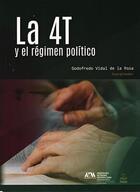This volume addresses a new problem of the Mexican political system: the gap between the implosion of the “neoliberal” democratization project and the emergence of a hyper-presidential regime. Starting from the premise that the presidential election of July 2, 2018 was a watershed in the history of the modern Mexican political system, the works collected here examine the scope and limitations of the hyper-presidential exercise to create new institutional bases for political life in Mexico , including a system of parties and electoral competition that is both functional and representative of citizens' preferences. The authors examine the changes in the architecture of the division of powers, both Congress and the Judiciary, and the “post-crisis” configuration of the party system, including the official party. Likewise, the new relationship between the new presidentialism and the politi...read more
Shopping cart
Loading cart
Important notices
|
|
Recordando a André Rouillé: Su legado en la fotografía André Rouillé 1948 - 2025 |
|
|
Libros de filosofía y co. Disponibles en Librería Herder |
|
|
Revista Filosofía & Co. nº 9 Nueva revista de filosofia divulgativa y actualidad |
|
|
"Espacios de la filosofía" - Mauricio Beuchot - Novedad Herder México |
|
|
Revista Filosofía & Co. nº 8 Nueva revista de filosofia divulgativa y actualidad |
Pay safely with:


In the webshop
New
|
|
Medios calientes 70159 $400.00 -0.00% $400.00 |
|
|
Amigdalatrópolis 70157 $390.00 -0.00% $390.00 |
|
|
La instauración filosófica 70142 $570.00 -20.00% $456.00 |
|
|
Adiós al capitalismo 70116 $580.00 -0.00% $580.00 |
|
|
Su Majestad 70410 $319.00 -15.00% $271.15 |
In the press
Promotions
|
|
Panorama A1.1, Deutsch als Fremdsprache Übungsbuch 36726 $235.00 -35.00% $152.75 |
|
|
El tratamiento de los niños autistas 70240 $675.00 -25.00% $506.25 |
|
|
Historia del arte I 70244 $1,545.00 -25.00% $1,158.75 |
|
|
Diccionario de términos filológicos 70241 $900.00 -25.00% $675.00 |
|
|
Verbos conjugados $600.00 -25.00% $450.00 |









